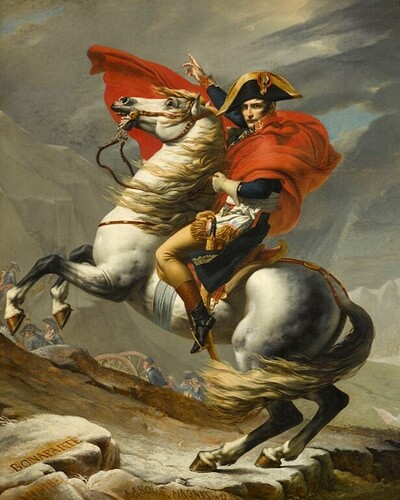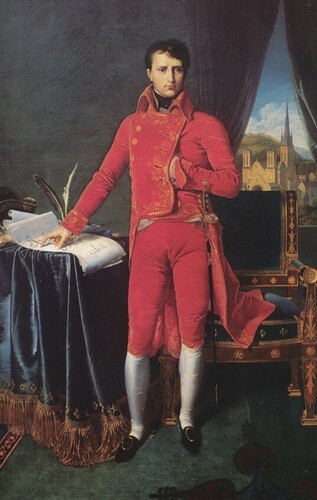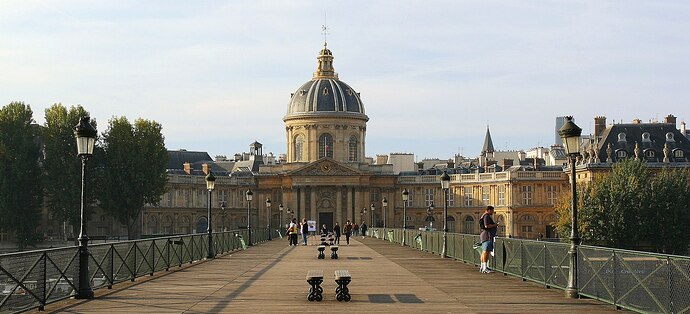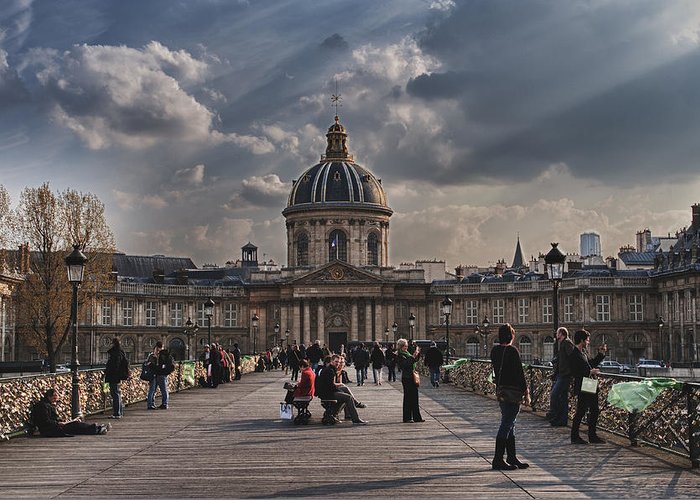Comment? Have you forgotten Louis XVIII, Charles X and Louis Philippe? All kings of France in the 19th century. Louis Napoleon, nephew of Napoleon I, was President for 4 years from 1848 and Emperor for 18 years 1852 - 1870. Who else were you thinking of as ruling France “for most of that century”?
Looks like Macron agrees with you Mark - he has drawn a distinction between ‘commémorer’ and ‘célébrer’ - and says he is commemorating without celebrating Napoleon.
[quote=“Poquelin, post:21, topic:34864, full:true”]
Louis Napoleon, nephew of Napoleon I, was President for 4 years from 1848 and Emperor for 18 years 1852 - 1870. [/quote]
Louis-Napoléon Bonaparte, Napoléon III, who was the first democratically elected French president by direct vote (only over-21 men had the right to vote then though). Was elected on a “Make France Great Again” platform… Comme quoi, Trump didn’t invent anything!
It was the first and also the last presidential election by universal suffrage until… 1965. As under the Third and Fourth Republics, French presidents were elected indirectly, by the parliament, i.e the Assemblée Nationale and the Sénat. The Fifth Republic, 1958-today, would change that, the whole structure and electoral system.
In that Third & Fourth Republic period, so between 1870 and 1958, the French president, elected by the parliament, merely had a representative function, the real power was in the hands of the “Président du Conseil” - a sort of PM, the leader of the government - and the Parliament.
During that period, France’s governing system was officially that of a parliamentary republic, meaning that the power was shared between (mostly) the parliament and the government. Being president was mostly a honorary title.
This system proved chronically unstable and impractical in a multi political party system such as France (as the 20th century unfolded, more and more parties emerged), particularly during the Fourth Republic era (1946-1958, 22 governments in 12 years!) as Proportional Representation was used… So
typically you’d have 5 or 6 parties each with approx. 80-100+ MPs in the National Assembly, such as in the 1951 Législatives (here) or in the 1956 ones (here), with the rest (another 5 or 6 parties) sometimes also having a substantial number of MPs (40-50), further fragmenting the parliamentary clout even more.
In other words, France was ungovernable, see wikis or other sources about the Fourth Republic for more details, hence the need for a root-and-branch reform. When the Algerian War crisis became unmanageable, spring 1958 (known as “La crise de mai 1958”), De Gaulle, who’d taken a back seat in the early 1950s following the electoral decline of his RPF party since the late 1940s, was prompted back into action in a “Cometh the hour, cometh the man” type moment. Six months later, in autumn 1958, the Fifth Republic was born and with it a new constitution, and Législatives elections were held, with the introduction of a new two-round system which facilitated governance and a parliamentary majority (The Gaullists just shaded it, see wiki).
But let’s return to this presidential election in December 1848, the first ever in France, a most interesting election.
Louis-Napoléon Bonaparte (Napoléon I’s nephew – and Victor Hugo’s nemesis, see Napoléon Le Petit , Les Châtiments and Histoire d’un crime) became the first French president in December 1848 (after years in prison and exile, some of them in London, he was 40 and had spent over 30 years in exile or prison, as a law voted in 1816 banished all members of the Bonaparte family from France, their assets were seized too) and then engineered a coup three years later that kept him in power till 1870 and the Franco-Prussian War which precipitated his demise (upon which the Third Republic was created, the very Republic that marked the advent of democracy in France and shaped the country as we know it know).
In 1848, the infamous “Year of the Revolutions broke out throughout Europe (and beyond), and France was engulfed in a political and social crisis (Revolution of February 1848, which sort of kickstarted the revolutionary movement throughout the world, although insurrections had started elsewhere a few months before, Switzerland for instance with Sonderbund Civil War which resulted in the unification of the country).
During this mostly Parisian revolution, the (short-lived) Second Republic was established and a provisional government tried to steer the ship for eight months, a doomed bateau ivre really, as other sporadic uprisings broke out that year until the autumn.
It is interesting to remember that one of the main leaders and figurehead of this provisional gvt was none other than the writer Alphonse de Lamartine (if you ever go to Macon in Burgundy, it’s all Lamartine there!), widely considered to be the first French Romantic poet ( Méditations poétiques, 1820) and politically a Republican centrist.
Lamartine is one of a small bunch of 19th century writers who became very politically active, along with Chateaubriand, Alexandre Dumas père , Victor Hugo of course and George Sand – although, unlike what’s written in her wiki, Sand was never ever a member of the 1848 provisional government (!). Crikey, women in France were nearly a century away from even being allowed to vote so never mind being part of a government! (Jesus, the crap you read on Wiki…). Women at that time weren’t allowed to rise anywhere near that level, some were politically active (as many had been during the French Revolution), some advised and were listened to but they certainly weren’t promoted to government level, that would come in France with the very leftwing Front Populaire in 1936 (junior ministers) but mainly after WWII, in recognition of their role during the war (that’s also why women were given the right to vote, but the pressure had been ramped up in the Interwar, particularly with the election of the Front Populaire), with the former Resistant Germaine Poinso-Chapuis the firt senior female minister in France.
Anyway, back to George Sand, she did support that provisional gvt though, as a fierce Republican, and female voices, notably the feminist writer Eugénie Niboyet – who founded the successful but sadly short-lived feminist newspaper La Voix des Femmes – put forward Sand’s name to the National Assembly in order to get a woman elected but Sand was against the idea. A big controversy ensued, the whole thing backfired and the autocratic Napoléon III had the paper, the first feminist one in France, closed down in 1852.
So, in December 1848 the first ever “democratic” elections took place in France (universal male suffrage: nearly 10 million male voters over 21; there’d been national parliamentary elections before, in 1791 and 1792 during the French Revolution but there was an epistocratic system in place then, called the “vote censitaire”, so only a handful people could vote, tax payers basically).
That Dec. 1848 presidential election meant a campaign, political rallies etc. Many people were functionally illiterate or/and didn’t have French as their first language so punchy slogans were of the essence. So Louis-Napoléon Bonaparte came up with the bombastic “Rendons sa grandeur à la France”, Make France Great Again… (referring of course to his uncle Napoléon I two generations before), his troops and campaigners criss-crossing France bellowing those tough-sounding slogans in village & town rallies.
Granted, it was a little more complex and nuanced than that but basically France was in chaos and people wanted a strongman at the helm, s.o with strong simple slogans and a manifesto of sorts full of populist pledges, and Louis-Napoléon Bonaparte, and his party (called “Parti de L’Ordre”) won by a landslide.
Three years later almost to the day, as the constitution barred him from running again for office, Louis-Napoléon Bonaparte seized power through a coup, and banished from France his main opponents, especially those who had had a hand in the insurrection following that coup, such as Victor Hugo…
Hugo was forced to go into hiding, and a week later into exile abroad which lasted nearly 20 years. First in Brussels, then Jersey and Guernsey where he lived for 15 yrs, where, inter alia, he finished Les Misérables . (unlike what most articles about his exile on Guernsey write, he didn’t write Les Misérables there, he merely finished it. He wrote ¾ of Les Misérables in Paris between 1845 and 1848, at his home on Place des Vosges in the Marais district, now a very interesting museum dedicated to him, do go if you’re ever in Paris. Free entry too as it belongs to the Paris Municipality! But I recommend the €5 audioguide. And big bonus: it now boasts a new tearoom giving onto the inner courtyard végétalisé, so it’s even more heavenly!
I wonder which of the "big figures of today " in cultural, sporting, political, business areas and who are current “movers and shakers” will in say 150 years be vilified as pillars of incorrectness of the early 21st century.?
interesting report on Macron’s speech about Napolepn in today’s Times. Also more comment on the small polling gap between him and M le P.
How true when he said: "What brings us together is the fight against ignorance, the love of knowledge and history, and will to yield nothing to those who want to wipe out the past because it does not correspond to the idea they have of the present.”
SPONSORED
Macron is comparatively good in this respect - acknowledging the evils of slavery and colonialism - compared for example with what in another thread I’ve just called the UK government’s Boys’ Own comic-book view of the glorious British Empire. Just think how hard to is to imagine - for instance - Boris Johnson giving a speech with a ‘balanced’ view of Churchill.
I don’t regard the Macron-LePen poll ratings as very significant, by the way - except with regard to the effect they might well be having on Macron. Although Macron is (rightly) unpopular, his problem is that people mostly mildly disapprove of him, whereas those who disapprove of LePen do so vehmently.
If you look back at votes both for her and her father (and actually it was the same for Farage in the UK) there seems to be a ceiling at around a third of votes cast - the real danger of such figures is I think more in their effect on other politicians than in actually getting elected - especially, as in the case of the LePens and Farages, if they are almost one-man-bands - no strength in depth of other elected representatives, or financial etc backing.
This semantic battle between “commémorer” and “célébrer” has been raging on for a while in France whenever there’s a major event, especially now in our era of “hypercommemoration”, with “commémorer” effectively meaning “célébrer” in this context today. It’s of course split along political lines.
Same thing at the mo with the (controversial) 150th anniversary (in Paris) of the Paris Commune this spring, the Parisian Left (elected officials) would love to say that they are “celebrating” the Commune but as this term would come across as too strong and divisive they prefer to use “commemorate”. From the Paris municipality site paris.fr: Un épisode historique qui a marqué les esprits. 150 ans après, la Ville de Paris a décidé de commémorer cet événement avec diverses manifestions.. Ditto the leftwing papers L’Humanité and Libération.
The Paris mayor, Socialist Anne Hidalgo: “Commémorer la Commune, oui, bien sûr.”
Whereas really what the Parisian Left means here is effectively “celebrate”, as despite the pandemic and the lockdown no fewer than 50 events (between 18th March and the end of May) have been organised by the Paris municipality to effectively celebrate the anniversary, which has always been very symbolic for the Left.
This semantic shift and strategic appropriation of “commemorate” (instead of celebrate) has forced the Parisian rightwing elected officials (muncipal council + rightwing MPs) to change their tack, they also occasionally use “commemorate” in relation to the Commune anniversary but in order to distance themselves from the Left’s rhetoric, when they use the term it’s often framed differently, more cautiously. I’ve heard a few rightwing councillors for instance talk of “considérer la commémoration”, or “marquer l’idée de commémoration”, “marquer l’occasion”. Subtle but telling differences.
In the article: “Speaking under the majestic cupola of the Institute of France in Paris,”
Lovely view of the Institut de France when approached from the Pont des Arts (the first metal bridge in Paris, built under Napoléon I, it was a different bridge from today), so walking towards the Saint-Germain-des-Près neighbourhood on the Left Bank:
(thankfully these dreadful “cadenas d’amour” - love padlocks - or whatever they were called have been removed, their weight threatened to damage the structure of the bridge. An artist turned them into an art piece which was exhibited in the Palais Royal garden last year)
I don’t use ‘likes’, ‘loves’, ‘hearts’ or any other kind of indicator after a nasty experience when it was used against me in another place, but I would like to thank @Fred1 for his fascinating and detailed explanation of French history in the last couple of hundred years. I was not taught that at school and had not read it in such detail before.
Thanks Fred. 
Just seen that Macron supports the vaccines patents waiver - so he has gone up a bit in my estimation.
very interesting article, how different then ensuing 200 years would have been!
They both had one characteristic in common. Called perseverance …
Merci buckets David!
The attempted invasion of Wales was hilarious, worthy of the Pieds Nickelés…
Now I did know about that, but certainly worthy of the re-telling. ![]()
![]()
That poor ape 
Hartlepool was it? ![]()
Macron had to do it. And what he did was minimalist.
Like him or not, Napoleon was a major actor in the history of France during a tumultuous period post-royalty that at first broiled France. He stopped that, which was necessary.
He brought many subtle changes to France, and real-democracy was not one of them. But, then, could the French have handled “real democracy” in the 19th century? Zat is ze goood kwestchun" … !



